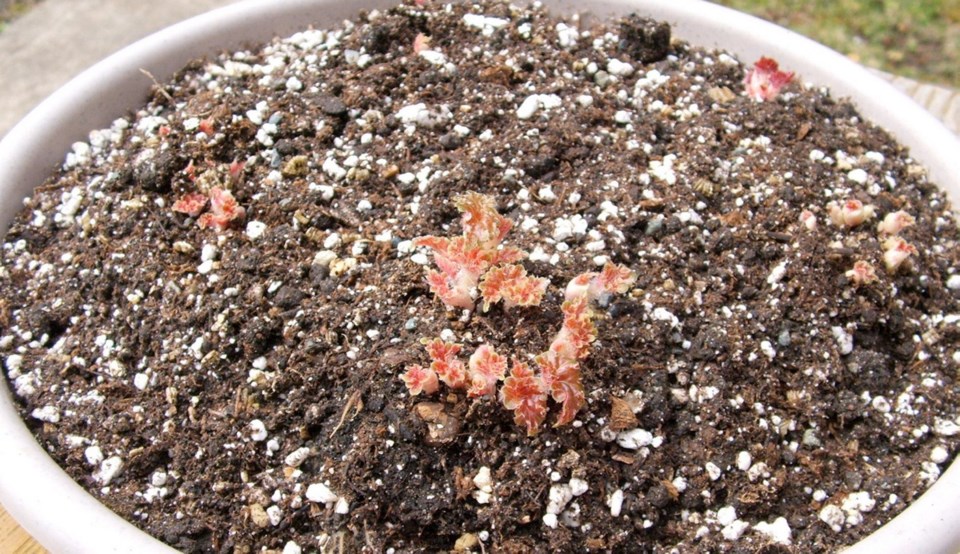Dear Helen: When should begonia tubers be started into growth? Is it too early?
S.B.
I’d do it as soon as possible. My time preference for starting up newly purchased or stored tubers is early March.
I store my tubers in a deep plant tray or newspaper-lined shallow box, nestled in and lightly covered by vermiculite. In March, I simply bring the box or tray into moderate warmth in the house, spray-mist the surface, and wait for tiny pink nubs of growth to appear. Once those nubs develop into a set of leaves, I pot the tubers in planting mix, barely covering the tuber tops with the mix, and place the containers in cool room temperatures and bright light short of direct, hot sun.
Transfer the plants to the garden or outdoor containers in the warmth of late spring.
Dear Helen: As I check my seeded flats for germination each morning, I’ve been surprised at how fast some seeds have sprouted. Does rapid germination also indicate fast growth and early harvesting?
P.S.
In my experience, yes. The first tomato varieties to germinate, for example, are usually the first to yield ripe tomatoes in the garden.
Some seeds, especially among the greens, germinate quickly. Caraflex, a popular pointed cabbage, germinated for me this year in four days.
Seed packets and catalogue listings usually note the number of days from planting to maturity.
These are not precise predictions, because growing conditions can vary considerably, but they give comparative values that are useful when seeking varieties that will mature at a desired extra early time or later in the season.
For vegetables that are commonly transplanted (tomatoes, peppers) the days to maturity are counted form the time of transplanting.
For vegetables seeded directly into the garden, such as carrots and beets, the number of days given are counted from the time of seeding.
Dear Helen: Our Honey Crisp apple produces fruit only every other year. Is there a remedy for this?
O.A.
Some apple varieties tend to be biennial bearers of fruit; that is, they will carry a large crop one year and hardly any or no apples the next. For a satisfactory crop each year, the remedy is to thin the fruit. Do this after the “June drop,” when the tree sheds excess fruit naturally.
If, after the June drop, the tree still carries a heavy load of fruit, thin by first removing any deformed or otherwise suspect fruit. Where there are several fruit clusters along a branch, thin to leave just one fruit to a cluster. If a branch carries just one fruit cluster, thin to leave two apples in that cluster.
Garden events
Lily meeting. The Victoria Lily Society will meet this evening (Wednesday, March 14) at 7 in the Salvation Army Citadel, 4030 Douglas St. Colin Tamboline will present Where Do Garden Lilies Come from? — a discussion and slide show on species lilies.
Nanaimo meeting. The Nanaimo Horticultural Society will meet this evening at 7 in First Unitarian Fellowship Hall, 595 Townsite Rd. There will be a talk on healthy soils, and a parlour show. Information at 250-758-6783.
Native plants. The Native Plant Study Group will meet on Thursday, March 15, at 7 p.m. in Room D-288 of UVic’s MacLaurin Building, D-Wing. Tom Krahl, owner of Nature’s Chef, will present Introduction to Foraging in the Pacific Northwest. Non-member drop-in fee is by donation, students free. Parking cost is $3. npsg.ca.
Point Ellice tours. Tours through historic Point Ellice House, 2616 Pleasant St. in Victoria, are available every weekend through March and April, 11 a.m. to 4 p.m. Visitors are invited to stroll the garden paths, enjoy high tea, and shop for treasures in the Vintage Shoppe. At 11 a.m. on March 31 and April 1, there will be an Easter Bonnet Workshop and Easter Egg Tour for children ($20) accompanied by an adult. To register and for more information call 250-380-6506. pointellicehouse.com.
HCP workshops. The Horticulture Centre of the Pacific, 505 Quayle Rd. in Saanich, is offering the following workshops. Register at 250-479-6162. hcp.ca.
• The Nature of the Native Plant Garden, Saturday, March 24, 9 a.m. to 12 p.m. Edible, deer-resistant and drought-tolerant plants will be highlighted. Members $45, others $60.
• Basketry with Gourds, Sunday, March 25, 9:30 a.m. to 4:30 p.m. Learn how to use gourds as a base for coiling. Members $120, others $140.



